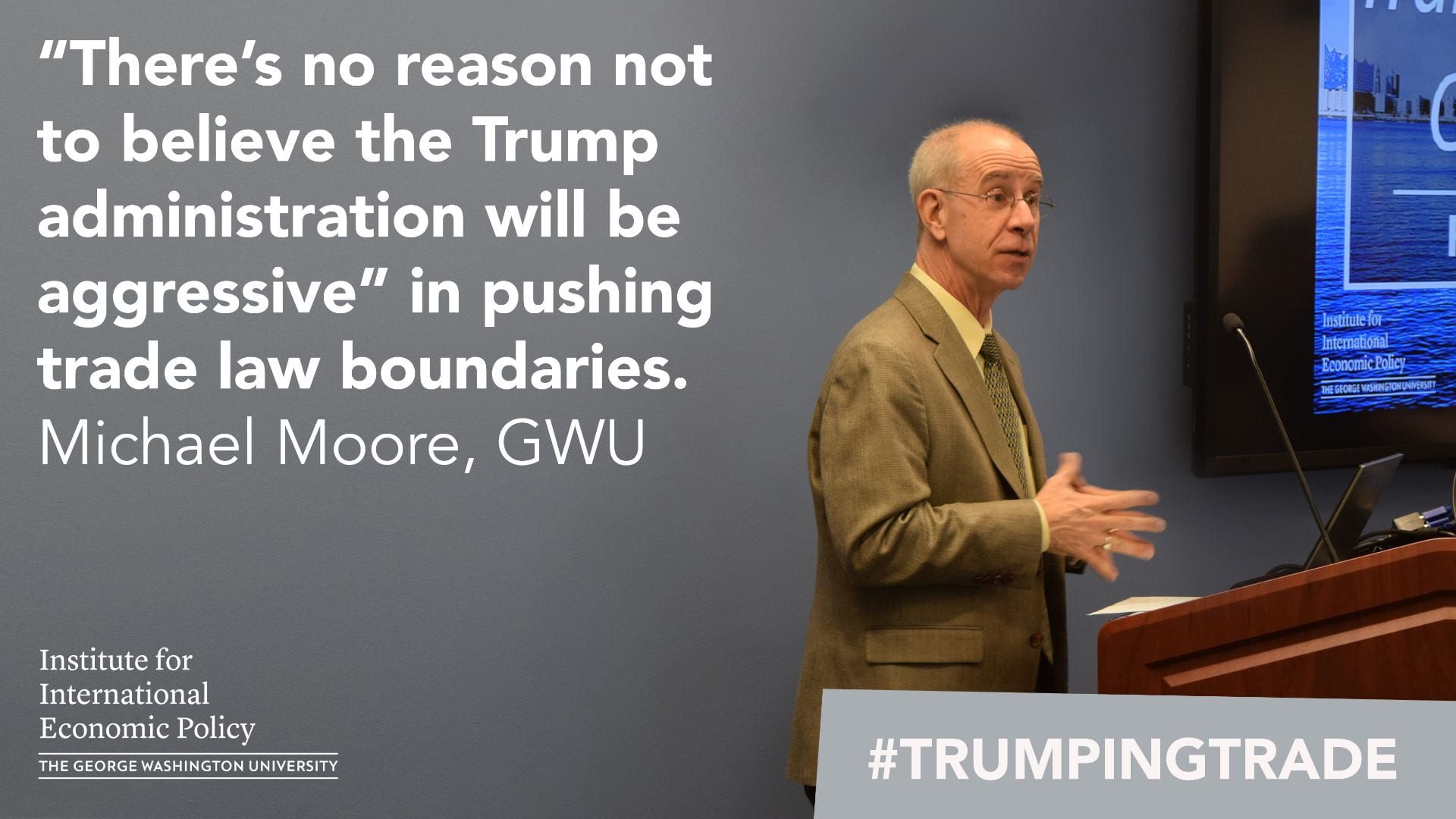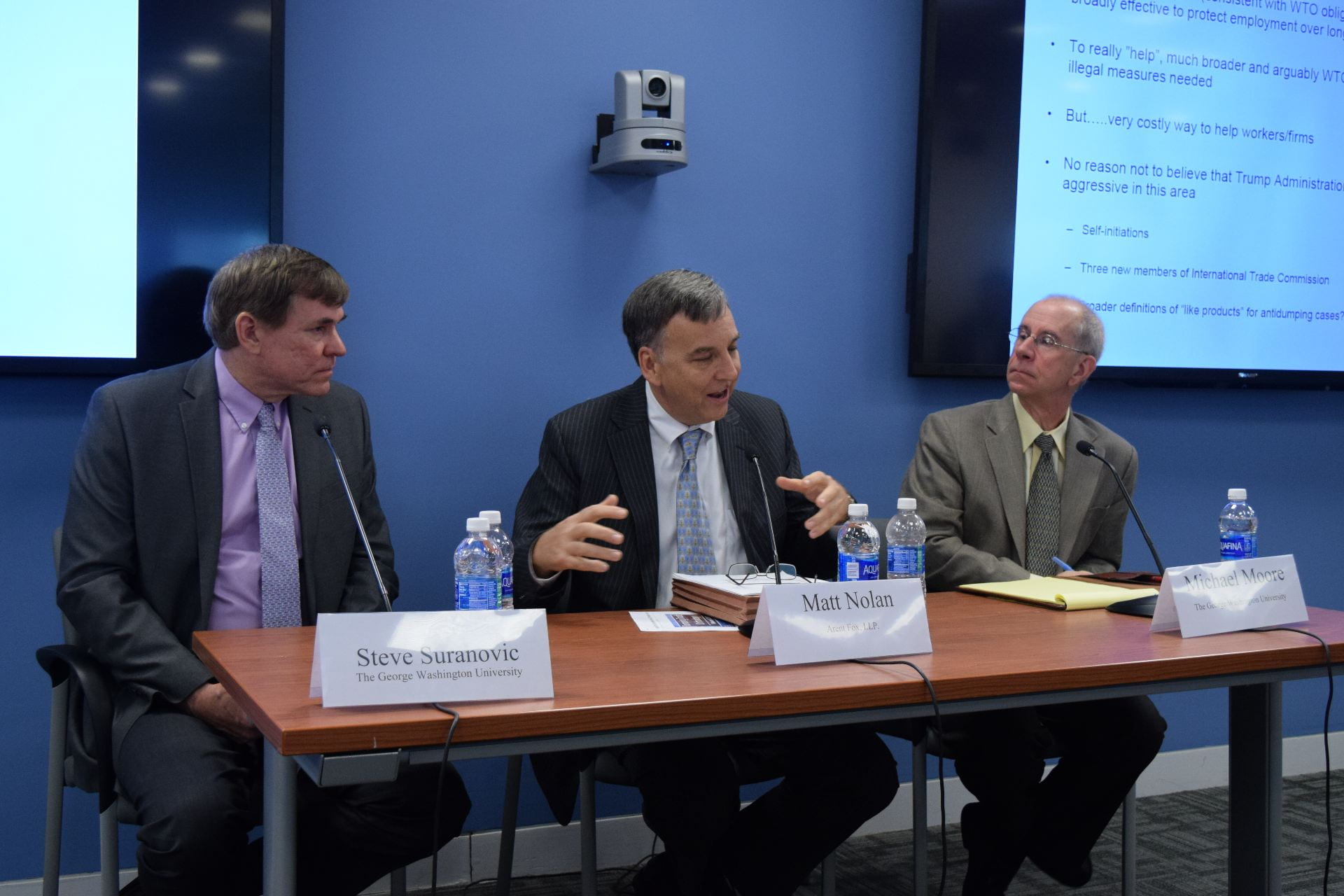Originally published on February 17, 2017
On the campaign trail, Donald Trump expressed deep concern about U.S. trade policies pursued by past Republican and Democratic administrations. President Trump may implement his vision of a new “America First” trade policy paradigm in part through aggressive use of trade remedies, such as antidumping duty and safeguard investigations.
Although President Trump has consistently called for a new trade policy approach, there are limitations on presidential power in influencing trade. The Institute for International Economic Policy (IIEP) hosted the “Trumping Trade Orthodoxy” on February 3, 2017, to talk about President Trump’s trade policy plans and the limitations on his powers as president under existing U.S. laws and practice.
Matthew Nolan, a trade lawyer from Arent Fox LLP, discussed the range of trade remedy actions possible for President Trump under current legislation.
Trade remedies have played a significant role in U.S. trade policy, according to Nolan. He anticipated that the Trump administration will interpret existing laws to benefit domestic firms seeking protection from injurious imports, which will be a more aggressive approach to trade policy than what we saw in the Obama administration. Nolan stated that President Trump’s zero-sum outlook could mean that he will pay less attention to international and domestic law, and that there may be an increase in litigation and protectionist activity. Nolan also expected that the administration may self-initiate trade remedy actions, which has rarely happened in the past.
Nolan discussed different forms of trade remedies, especially anti-dumping laws that focus on unfair foreign pricing, with attention to both the U.S. International Trade Commission (ITC), which determines whether imports injure domestic firms, and the International Trade Administration (ITA), which regulates the level of dumping. While the ITC is generally insulated from political pressure by design, Nolan indicated that the ITA’s approach could change more substantially through directives from President Trump. Nolan also noted the role of the U.S. courts in limiting the scope of dramatic changes from current practices in trade remedies. Despite the limiting powers of the courts and the hope that WTO rules will be upheld, Nolan noted that the Trump administration’s rhetoric over trade does not guarantee that this will be the case.
Michael Moore, Professor of International Affairs and Economics at the Elliott School and IIEP affiliate, expressed similar concerns from the perspective of an economist. The Trump administration has promised to chart a path away from trade tradition and Moore noted that “we cannot expect things to be done as they have in the past.” However, previous experience with trade remedies suggests that past actions have been ineffective at sustaining employment levels and effectively lowering imports from all sources. Trade remedies directed at only some countries have meant that other countries will soon move in to fill the space left behind. Only a more widespread use of trade remedies, potentially breaking NAFTA and WTO rules, could be effective at limiting imports.
Moore concluded that protests over an aggressive use of trade remedies are unlikely and believes they could receive widespread popular support. However, just as Nolan expressed earlier, the protectionist and “America First” aims of President Trump are considered unwise by even the most orthodox trade experts. The impacts of such unwise trade policies will be difficult for popular opinion to see, but the changes and damage will likely be visible in the long term.
While answering questions from the audience, Nolan and Moore mentioned the possibility of retaliation from other countries. This retaliation is a concern for both. Actions inconsistent with current rules may be particularly dangerous since growing economic power in other regions means that retaliation could occur quickly. President Trump may gain national support for protectionist policy, but the U.S. is no longer the only global power player, and confronting other global powers is an increasingly problematic game.
Watch Matthew Nolan and Michael Moore’s presentations and discussion with the audience below:



